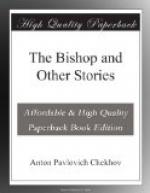“Do you call those oats?” the customer said gloomily. “Those are not oats, but chaff. It’s a mockery to give that to the hens; enough to make the hens laugh. . . . No, I will go to Bondarenko.”
When Yegorushka went back to the river a small camp fire was smoking on the bank. The waggoners were cooking their dinner. Styopka was standing in the smoke, stirring the cauldron with a big notched spoon. A little on one side Kiruha and Vassya, with eyes reddened from the smoke, were sitting cleaning the fish. Before them lay the net covered with slime and water weeds, and on it lay gleaming fish and crawling crayfish.
Emelyan, who had not long been back from the church, was sitting beside Panteley, waving his arm and humming just audibly in a husky voice: “To Thee we sing. . . .” Dymov was moving about by the horses.
When they had finished cleaning them, Kiruha and Vassya put the fish and the living crayfish together in the pail, rinsed them, and from the pail poured them all into the boiling water.
“Shall I put in some fat?” asked Styopka, skimming off the froth.
“No need. The fish will make its own gravy,” answered Kiruha.
Before taking the cauldron off the fire Styopka scattered into the water three big handfuls of millet and a spoonful of salt; finally he tried it, smacked his lips, licked the spoon, and gave a self-satisfied grunt, which meant that the grain was done.
All except Panteley sat down near the cauldron and set to work with their spoons.
“You there! Give the little lad a spoon!” Panteley observed sternly. “I dare say he is hungry too!”
“Ours is peasant fare,” sighed Kiruha.
“Peasant fare is welcome, too, when one is hungry.”
They gave Yegorushka a spoon. He began eating, not sitting, but standing close to the cauldron and looking down into it as in a hole. The grain smelt of fish and fish-scales were mixed up with the millet. The crayfish could not be hooked out with a spoon, and the men simply picked them out of the cauldron with their hands; Vassya did so particularly freely, and wetted his sleeves as well as his hands in the mess. But yet the stew seemed to Yegorushka very nice, and reminded him of the crayfish soup which his mother used to make at home on fast-days. Panteley was sitting apart munching bread.
“Grandfather, why aren’t you eating?” Emelyan asked him.
“I don’t eat crayfish. . . . Nasty things,” the old man said, and turned away with disgust.
While they were eating they all talked. From this conversation Yegorushka gathered that all his new acquaintances, in spite of the differences of their ages and their characters, had one point in common which made them all alike: they were all people with a splendid past and a very poor present. Of their past they all— every one of them—spoke with enthusiasm; their attitude to the present was almost one of contempt. The Russian loves recalling




